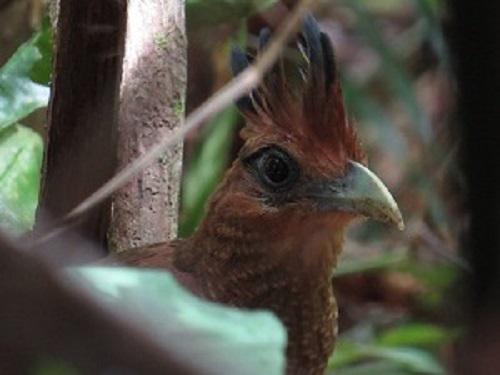Nicholas Bayly
Other projects
20 Dec 2007
Evaluating a Stepping Stone for Neotropical Migratory Birds – The Belizean North-East Biological Corridor
24 Jul 2009
Crossing the Caribbean: Identifying Critical Fuelling Sites for Neotropical Migratory Birds in Northern Colombia
10 Jan 2011
Crossing the Caribbean: Working Towards Effective Protection of Critical Stopover Sites for Migratory Birds in Northern Colombia
This project aims to increase the aesthetic and economic value of forested habitats in the biodiversity and migratory bird hotspot that is the Colombian Darién. Through a multi-pronged approach, including environmental education, guide training, the publication of a physical and online guide to the region’s wildlife and a celebration of the migration of millions of raptors through the region, we aim to incentivize the sustainable use of the region’s natural resources through ecotourism.
%20captured%20by%20camera%20traps/0d5613b42d4d23609287db9c5d56eb19.JPG)
The female Great Curassow (VU) captured by camera traps.
The Darién of Colombia forms part of one of the most important land bridges in the World, ensuring a terrestrial connection between North, Central and South America. This vital corridor is not only a biodiversity hotspot that facilitates the movement of species between continents, thereby playing a unique role in the evolution of biological communities in the Americas, but it also represents a globally important flyway for migratory birds.

Rufous-vented Ground Cuckoo - a rarely glimpsed forest specialist.
In a previous stage of this project, over one million birds were recorded migrating through the Darién over two years, including 744,000 raptors and 386,000 swallows and swifts. Thousands of migratory land birds also stop in the forests of this region, where they recover after long over-sea crossings. Despite the global importance of the forests of the Darién to migratory birds and to biodiversity in general, rates of deforestation have increased in recent years as the region has become more accessible. This project aims to promote both the economic and aesthetic value of the remaining forests through educational campaigns and providing the tools for ecotourism initiatives (guide training, a guide to the region’s wildlife, website promoting wildlife viewing sites), thereby providing an alternative to deforestation for cattle pastures.